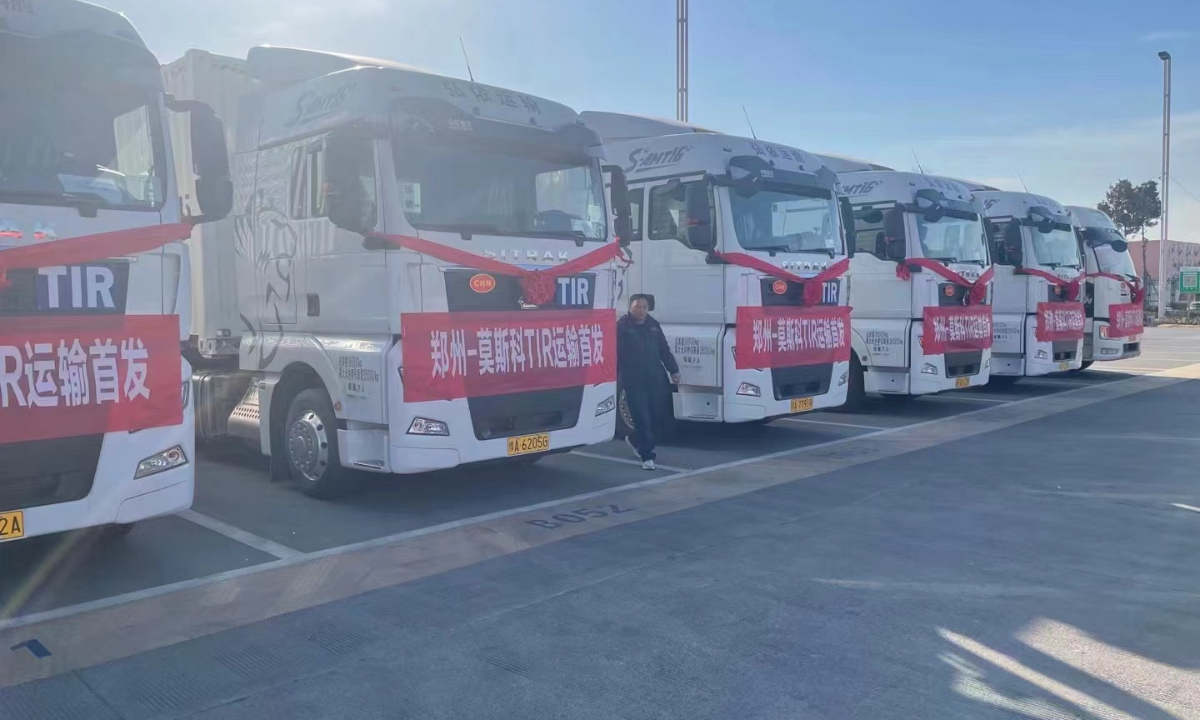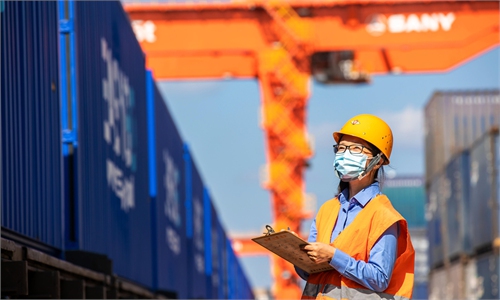First cross-border road freight line between Henan and Moscow launches in response to closer trade ties

The launching ceremony of the first TIR cross-border road freight line between Central China's Zhengzhou and Moscow on February 20, 2023 Photo: Courtesy of Zhengzhou Huanhang International Freight Co
A truck loaded with Chinese-made daily commodities such as handsets departed from the Zhengzhou Xinzheng Comprehensive Bonded Zone in Zhengzhou, the transportation and manufacturing hub in Central China's Henan Province, on Monday before heading to Moscow, marking the first Transport Internationaux Routiers (TIR) cross-border road freight line between the two places as companies tap into the potential of booming China-Russian trade.
The truck service is a supplement for the China-Europe freight train, which has been running at full capacity amid rising trade flows, industry insiders said. Monday's launch sets an example for similar cargo lines to be opened in response to vigorous market demand.
The development of the TIR-based global road transportation system, which China started full implementation of June 2019, enables vehicles with TIR certificates to cross borders between member countries in an easy and simplified manner, which means lower costs and less time.
So far, 77 countries have joined in this system, according to media reports.
In comparison with air, sea and rail transport, the TIR system can save up to 58 percent of the transportation time and 38 percent of the costs, the reports said.
Zhengzhou Hongyi Transport, a logistics company in charge of the delivery of the first batch of goods, has scrambled to deal with rising orders, mostly home appliances, which are piled up until May.
After departing from Zhengzhou on Monday, the first truck, which will bypass the China-Russia border port at Manzhouli in the Inner Mongolia Autonomous Region, is due to arrive at Moscow in eight days after a 9,800-kilometer journey, an employee with the company told the Global Times.
Some value-added goods such as handsets made in East China's Yiwu are being delivered by the truck, the Global Times learned.
The TIR line is a good supplement to the current options, particularly the China-Europe freight train, industry insiders said.
Zhang Tianbang, general manager of Zhengzhou Huanhang International Freight Co, who participated in the launch, is excited about the new transport service, since there is a growing need for diversified options.
Since the first China-Europe freight train was dispatched in July 2013, over 7,000 trains have run from Zhengzhou to Europe as of Sunday, serving more than 12,000 trade companies, a historic high.
While the China-Europe freight train is gaining more popularity and a wider reach, the new TIR truck service enables faster delivery, the insider said.
For example, the truck takes around 10 days to reach Central Asian countries and less than 12 days to Moscow, compared with around 16 days for a similar journey by train, Zhang said.
Given the high demand for the China-Europe freight train, one has to wait until March 10 for the earliest delivery, while the truck line, as a fairly new service, can be booked faster, Zhang said.
While domestic customs and port operators have been simplifying border-passing procedures and upgrading facilities, the low efficiency levels of some ports overseas, together with other factors, make it difficult to meet the demands of the fast-booming trade, particularly for exports, Song Kui, president of the Contemporary China-Russia Regional Economy Research Institute, told the Global Times on Monday.
Vigorous demand for Chinese daily commodities, driven by the fast development of cross-border e-commerce, has bolstered exports to Russia, Song said.
In 2022, China-Russia trade exceeded $190 billion, a year-on-year growth of 29.3 percent. Chinese exports to Russia amounted $76.12 billion, jumping by 12.8 percent year-on-year, data from the General Administration of Customs showed.
Russian Ambassador to China Igor Morgulov said recently during an interview with RIA that he expects trade between China and Russia this year to exceed $200 billion.
"The opening of the cargo truck route, as a good supplement, will further promote bilateral trade, which is complementary," Song said, expecting more TIR transport lines to open soon.

